人教版八年级英语下册unit4第五课时导学案
- 格式:doc
- 大小:43.00 KB
- 文档页数:3
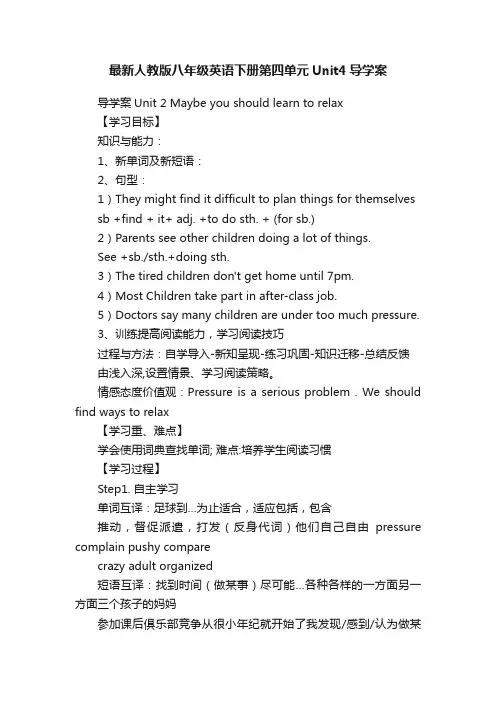
最新人教版八年级英语下册第四单元Unit4导学案导学案Unit 2 Maybe you should learn to relax【学习目标】知识与能力:1、新单词及新短语:2、句型:1)They might find it difficult to plan things for themselves sb +find + it+ adj. +to do sth. + (for sb.)2)Parents see other children doing a lot of things.See +sb./sth.+doing sth.3)The tired children don't get home until 7pm.4)Most Children take part in after-class job.5)Doctors say many children are under too much pressure.3、训练提高阅读能力,学习阅读技巧过程与方法:自学导入-新知呈现-练习巩固-知识迁移-总结反馈由浅入深,设置情景、学习阅读策略。
情感态度价值观:Pressure is a serious problem . We should find ways to relax【学习重、难点】学会使用词典查找单词; 难点:培养学生阅读习惯【学习过程】Step1. 自主学习单词互译:足球到…为止适合,适应包括,包含推动,督促派遣,打发(反身代词)他们自己自由pressure complain pushy comparecrazy adult organized短语互译:找到时间(做某事)尽可能…各种各样的一方面另一方面三个孩子的妈妈参加课后俱乐部竞争从很小年纪就开始了我发现/感到/认为做某事很难压力太大和---比较有组织的活动直到…才翻译句子a) 孩子们直到写完作业才上床睡觉。
b) 在海伦到来前我不会离开。
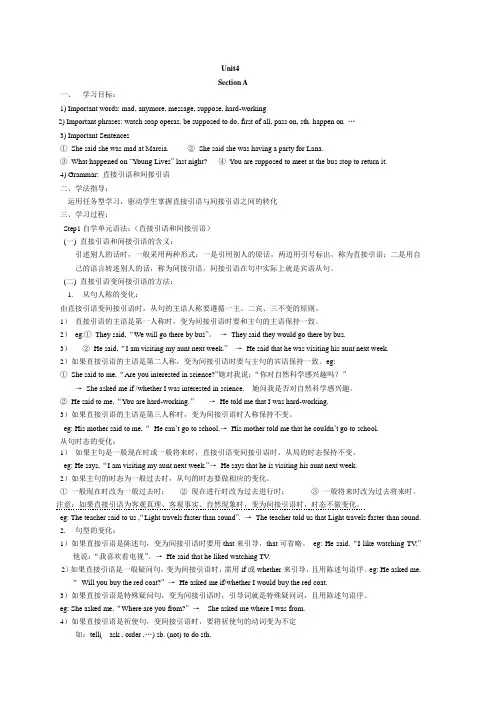
Unit4Section A一、学习目标:1) Important words: mad, anymore, message, suppose, hard-working2) Important phrases: watch soap operas, be supposed to do, first of all, pass on, sth. happen on …3) Important Sentences①She said she was mad at Marcia. ②She said she was having a party for Lana.③What happened on “Young Lives” last night? ④You are supposed to meet at the bus stop to return it.4) Grammar: 直接引语和间接引语二、学法指导:运用任务型学习,驱动学生掌握直接引语与间接引语之间的转化三、学习过程:Step1自学单元语法:(直接引语和间接引语)(一) 直接引语和间接引语的含义:引述别人的话时,一般采用两种形式:一是引用别人的原话,两边用引号标出,称为直接引语;二是用自己的语言转述别人的话,称为间接引语。
间接引语在句中实际上就是宾语从句。
(二) 直接引语变间接引语的方法:1.从句人称的变化:由直接引语变间接引语时,从句的主语人称要遵循一主、二宾、三不变的原则。
1)直接引语的主语是第一人称时,变为间接引语时要和主句的主语保持一致。
2)eg:①They said,“We will go there by bus”。
→They said they would go there by bus.3)②He said,“I am visiting my aunt next week.”→He said that he was visiting his aunt next week.2)如果直接引语的主语是第二人称,变为间接引语时要与主句的宾语保持一致。
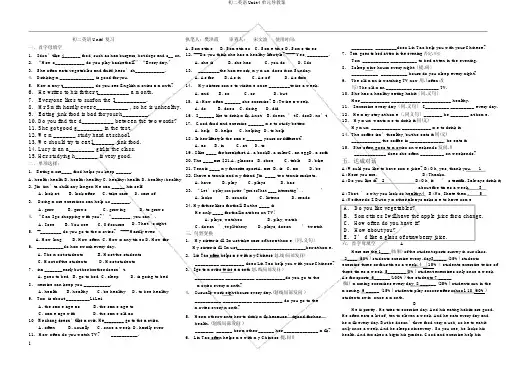
初二英语 Unit4 复习执笔人:樊洪霞审查人:宋文波使用时间:一.首字母填空1.I don’tlike j_______ food, such as hamburgers, hot dogs and s__ on.2.“How o___________ do you play basketball?〞“Every day.〞3.She often eats vegetables and fruit s,heso’s h___________.4.Drinking m_____________ is good for you.5.How many t____________ do you see English movies a month?6.He writes to his father t__________ a month.7.Everyone likes to surf on the I__________.8.Mr Smith hardly ever e__________ , so he is unhealthy.9.Eating junk food is bad for your h________.10.Do you find the d__________ between the two words?11.She got good g________ in the test.12.We m_______ study hard at school.13.We should try to eat l_______ junk food.14.Lucy is an a________ girl in the class.15.Her studying h_______ is very good.二.单项选择:1.Eating more____ food helps you keep ______.A. health; healthB. health; healthyC. healthy; healthD. healthy; healthy2. Jim isn’ta child any longer. He can _____ himself.A. look atB. look afterC. take careD. care of3.Doing more exercises can help us _______.A. growB. growsC. growingD. to grows4.“Can I go shopping with you?〞“_______, you can〞.A. I seeB. You seeC. Of courseD. That’s right5.--________ do you go to the movies? ----- Hardly ever.A. How longB. How oftenC. How many timesD. How far6.__________do homework every day.A. The most studentsB. Most the studentsC. Most of the studentsD. Most students7、 ina _______early but her brother doesn’t.A. goes to bedB. go to bedC. sleepD. is going to bed8、 xercise can keep you __________.A. healthB. healthyC. be healthyD. to bee healthy9.Tom is about _________Li LeiA. the same age asB. the same age toC. same age withD. the same old as10Mr zhang doesn’tlike movie. He________ go to the movies.A. oftenB. usuallyC. once a weekD. hardly ever11. How often do you watch TV?__________.A. Sometime B. Sometimes C. Some time D. Some times12. ----Do you think she has a healthy lifestyle?------ Yes, ________.A. she isB. she hasC. you doD. I do13.________the homework, my mum does it on Sunday.A. As forB. As inC. As ofD. As from14.My sisters come to visit me once ________twice a week.A. andB. soC. orD. but15.A: How often ______ she exercise? B: Twice a week.A. doB. doesC. doingD. did16. I ______ like to drink milk. Anot. B. doesn ’ t C. donD. no’t17.Good food and exercise ______ me to study better.A. helpB. helpsC. helpingD. to help18. Is her lifestyle the same ______ yours or different?A. asB. inC. atD. to19 . I like ____ for breakfast. A. a bookB. a ruler C. an eggD. a sofa20.The ____are $21.A. glasses B. shoe C. table D. bike21.Tennis ____ my favorite sport.A. are B. is C. am D. be22.I have a tennis and my friend Jim ____ two tennis rackets.A. haveB. playC. playsD. has23.“ Let ’ s play computer “gamesThat. ____ interesting〞.〞A. looksB. soundsC. listensD. reads24.My father likes football. But he ____ it.He only ____ football matches on TV!A. plays, watchesB. play, watch三.C. doesn’ ,t wpl a tchesyD. plays, doesn’ t watch句型变换1.My sister is ill. I must take care of her at home〔同.义句〕My sister is ill. I must__________________________her at home.2.Lin Tao often helps me with my Chinese划.线(局部发问)_________ _________ does Lin Tao help you with your Chinese?3.I go to movies twice a month划.(线局部发问 )___________ ___________ ___________do you go to themovies every month?4.I usually work eight hours every day.(划线局部发问 )__________ ___________ ___________ do you go to themovies every month?5.Her mother wants her to drink milk because’itgood for herhealth. (划线局部发问 )_______ ______ her mother ______ her _____________ milk?6.Lin Tao often helps me with my Chinese提.问()________ ________does Lin Tao help you with your Chinese?7.Tom goes to bed at ten in the evening否定.(句)Tom __________ __________ to bed at ten in the evening.8.I sleep nine hours every night〔提.问〕__________ __________ hours do you sleep every night?9.The old man is watching TV now用.( often改写) The old man __________ __________ TV.10.She has a healthy eating habit〔同.义句〕Her ___________ ___________ ___________ healthy.11.I exercise every day〔同.义句〕 I _________ _________ every day.12.He may stay at home〔.同义句〕_______ he _______ at home.13.My mum wants me to drink it.同(义)My mum ___________ ___________ me to drink it.14.The coffee isn’thealthy, but he eats it.同(义)___________ the coffee is _____________, he eats it.15.She often goes to movies on weekends发问.()____________ does she often _________ on weekends?五.达成对话A: Would you like to have some juice? B: Oh, yes, thank you.1A: Here you are.B: Thanks.A: Do you like it? 2B: Oh, it’ s terrific. I always drink it,about five times a week.3A: That ’ s why you look so healthy.4 B: No, I hate them.5A:Neither do I. But my mother always asks me to have someA.Do you like vegetables?B.Sometimes I will have the apple juice for a change.C.How often do you have it?D.How about you?E.I ’ d like a glass of strawberry juice.六.首字母填空AHere are the 1___ (结果) of the student sports survey in our class.2____ (60%) students exercise every .day3_____ (25%) studentsexercise three or four times a week. 4 〔15%〕students exercise twice ofthree times a week. 5_______(0%) student exercises only once a week.As for sports, 6______(100%) the students 7 _____(做) morning exercises every day, 8 ______ (25%) students run in themorning. 9 _____ (15%) students play soccer after school. 10 (60%)students swim once a month.BHe is pretty . He tries to exercise day. And his eating habits are good.He often eats a lot of , ten to eleven a week. And he eats every day andhe milk every day. But he doesn’tlove food very much, so he to eat itonly once a week. And he sleeps nineevery . So you see, he looks hishealth. And it makes a bigto his grades. Good and exercise help him1to study better. 2Unit4单元复习练习题课型:复习执笔人:樊洪霞审查人:宋文波使用时间:一.选择题like English very much, so I ____________ listen to the tape in the morning.A. usuallyB. hardly everC. never2.— What does your father do in the evening?—He usually ____________.A. watch TVB. exercisesC. read books3.— ____________ do you go skating?—Every day. A. How often B. How many C. When4.— ____________ does he do sports every day? — He does sports for two hours every day.A. How manyB. How oftenC. How long 〔多长时间〕up, then you can be successful(成功 ) .〞 A. Always B. Sometimes C. Neverfood and exercise help me to study _____. A. good B. better C. less二、词汇old man ____________( 体育锻炼 )every morning.often go shopping ____________ ____________( 在周末 ).little boy ____________ ( 以前 )falls off that tall tree.____________( 多久一次 )do you see your grandma?____________ ____________ ( 几乎未曾 )goes to restaurant for dinner.don' t often _________ __________ __________ __________( 看电影 ).I usually watch三.依据图片,说出他们参加的是什么活动吗?1. She often goes out for a trip.2. She sometimes ___________.3. She hardly ever_______.4. Her friend Jim usually asks her to______ on Sundays.5. She usually ___________on weekends.6. She likes __ ____________四.阅读理解(1)Early to bed ,early to get up makes man healthy , wealthy and clever.This is an old English saying 〔谚语〕 . Have you heard of it before? It means that we must go to bed early at night and get up early in the morning. Then we shall be healthy. We shall also berich 〔 wealthy 〕and clever.This is true. The body must have enough( 足够的 ) sleep to be healthy. Children of young age should have ten hours ’sleep every night. Children who do not have enough sleep cannot dotheir work very well. They will not be clever and they may not get wealthy!The body also needs exercise. Walking,running ,jumping( 跳 ),swimming and playing games are all exercise. Exercise keeps the body strong( 强健 ).Exercise also helps the blood 〔血液〕to move around inside the body. This is very important( 重要的 ). Our blood takes food to all parts of our body. The head also needs blood. Exercise helps us to think better!1. If we get up early and go to bed early , we’ll ________.A .have enough exercise B.be healthy C.think better D .have strong blood 2. If a child doesn ’thave 10 hours’sleep, maybe he or she ________.A. will get clever B.won’tdo well in his work C .will go to school in time( 准时 ) D .will have enough sleep3. A person needs exercise because ______.A .it makes him healthyB . he or she has a lot of homework to doC. he or she is strong enough D .he or she does exercise4. Exercise makes the ________ move quickly and smoothly 〔流利地〕 .A. bodyB. bloodC. childrenD. head5. Keeping taking exercise every day can make our body ________.A. sleepyB. tiredC. strongD. bad(2)Everybody wants to be healthy. You know food is very important. There are many healthy foods. You can have more bananas, apples, oranges, tomatoes and cabbages because fruits and vegetables are good for you. But don ’teat too much chocolate. It ’s not good healthy food. Healthy food can make you grow and make you strong and happy. Remember there is a saying, “An apple a day keeps the doctor away. 〞Sports can also keep you healthy. Get up early and do some sports every day. Don’tbe lazy! You will be healthy and happy.6. Which is right( 正确 )? A. Everybody is healthy. B. We want to be healthy. C. We are important.7.What are healthy foods? A. Fruits and vegetables. B. Bananas, apples and chocolate. C. Fruits and chocolate.8.Why are healthy foods good for you?A. They make me happy.B. They make me grow strong.C. They make me grow and make me strong and happy.9. “An apple a day keeps the doctor away 〞means(意思是 ) “〞A. The doctor goes away when he Name activity how activity how sees an apple.B. The doctorruns away when you give him anapple.exercise junk foodC. You eat an apple every day andyou can be healthy.vegetable dislikePeter10. What keeps you healthy? A.Fruits and vegetables. B.Healthy foods. C. Healthy foodsand sports.〔3〕 . 任务性阅读达成以下表格或问题。
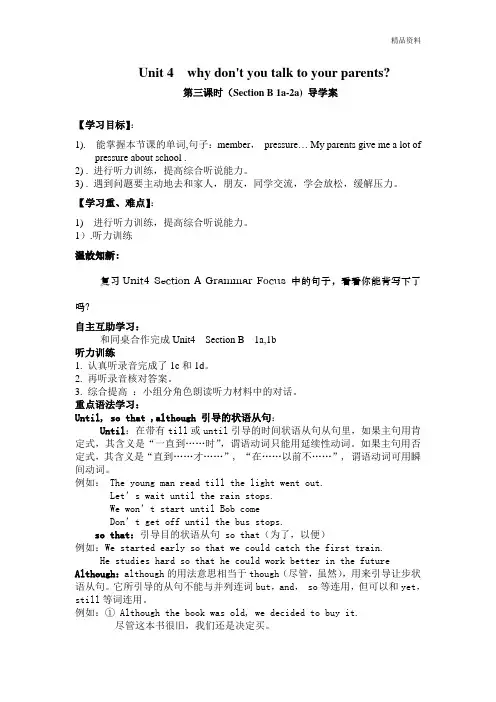
Unit 4 why don't you talk to your parents?第三课时(Section B 1a-2a) 导学案【学习目标】:1). 能掌握本节课的单词,句子:member,pressure… My parents give me a lot ofpressure about school .2) . 进行听力训练,提高综合听说能力。
3) . 遇到问题要主动地去和家人,朋友,同学交流,学会放松,缓解压力。
【学习重、难点】:1) 进行听力训练,提高综合听说能力。
1).听力训练温故知新:复习Unit4 Section A Grammar Focus 中的句子,看看你能背写下了吗?自主互助学习:和同桌合作完成Unit4 Section B 1a,1b听力训练1. 认真听录音完成了1c和1d。
2. 再听录音核对答案。
3. 综合提高:小组分角色朗读听力材料中的对话。
重点语法学习:Until, so that ,although 引导的状语从句:Until:在带有till或until引导的时间状语从句从句里,如果主句用肯定式,其含义是“一直到……时”,谓语动词只能用延续性动词。
如果主句用否定式,其含义是“直到……才……”, “在……以前不……”, 谓语动词可用瞬间动词。
例如: The young man read till the light went out.Let’s wait until the rain stops.We won’t start until Bob comeDon’t get off until the bus stops.so that:引导目的状语从句 so that(为了,以便)例如:We started early so that we could catch the first train.He studies hard so that he could work better in the future Although:although的用法意思相当于though(尽管,虽然),用来引导让步状语从句。
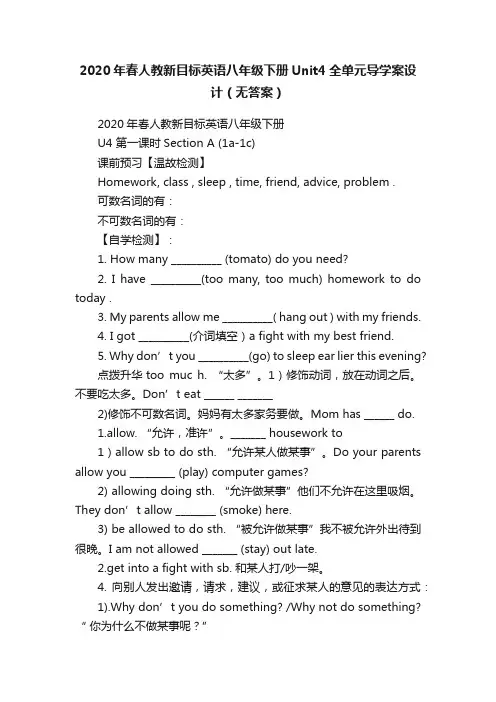
2020年春人教新目标英语八年级下册Unit4全单元导学案设计(无答案)2020年春人教新目标英语八年级下册U4 第一课时Section A (1a-1c)课前预习【温故检测】Homework, class , sleep , time, friend, advice, problem .可数名词的有:不可数名词的有:【自学检测】:1. How many __________ (tomato) do you need?2. I have __________(too many, too much) homework to do today .3. My parents allow me __________( hang out ) with my friends.4. I got __________(介词填空)a fight with my best friend.5. Why don’t you __________(go) to sl eep ear lier this evening?点拨升华too muc h. “太多”。
1)修饰动词,放在动词之后。
不要吃太多。
Don’t eat ______ _______2)修饰不可数名词。
妈妈有太多家务要做。
Mom has ______ do.1.allow. “允许,准许”。
_______ housework to1)allow sb to do sth. “允许某人做某事”。
Do your parents allow you _________ (play) computer games?2) allowing doing sth. “允许做某事”他们不允许在这里吸烟。
They don’t allow ________ (smoke) here.3) be allowed to do sth. “被允许做某事”我不被允许外出待到很晚。
I am not allowed _______ (stay) out late.2.get into a fight with sb. 和某人打/吵一架。
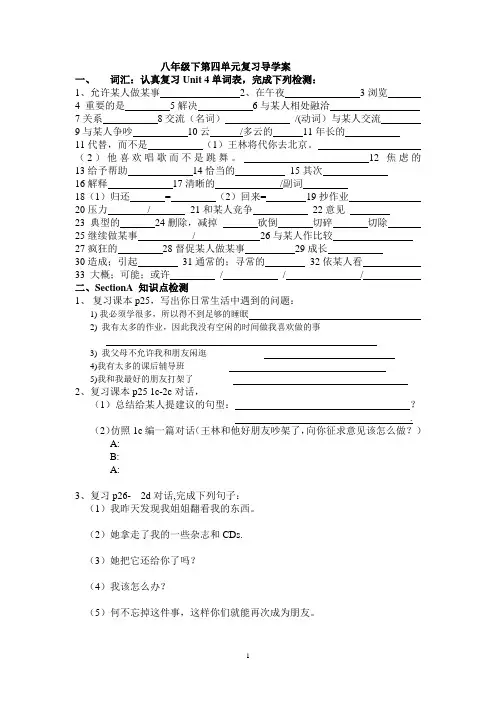
八年级下第四单元复习导学案一、词汇:认真复习Unit 4单词表,完成下列检测:1、允许某人做某事2、在午夜3浏览4 重要的是5解决6与某人相处融洽7关系8交流(名词)/(动词)与某人交流9与某人争吵10云/多云的11年长的11代替,而不是(1)王林将代你去北京。
(2)他喜欢唱歌而不是跳舞。
12焦虑的13给予帮助14恰当的15其次16解释17清晰的/副词18(1)归还= (2)回来= 19抄作业20压力/ 21和某人竞争22意见23 典型的24删除,减掉砍倒切碎切除25继续做某事/ 26与某人作比较27疯狂的28督促某人做某事29成长30造成;引起31通常的;寻常的32依某人看33 大概;可能;或许/ / /二、SectionA 知识点检测1、复习课本p25,写出你日常生活中遇到的问题:1)我必须学很多,所以得不到足够的睡眠2) 我有太多的作业,因此我没有空闲的时间做我喜欢做的事3) 我父母不允许我和朋友闲逛_____________ __4)我有太多的课后辅导班__________ __5)我和我最好的朋友打架了_________2、复习课本p25 1c-2c对话,(1)总结给某人提建议的句型:?.(2)仿照1c编一篇对话(王林和他好朋友吵架了,向你征求意见该怎么做?)A:B:A:3、复习p26- 2d对话,完成下列句子:(1)我昨天发现我姐姐翻看我的东西。
(2)她拿走了我的一些杂志和CDs.(3)她把它还给你了吗?(4)我该怎么办?(5)何不忘掉这件事,这样你们就能再次成为朋友。
(6)不是什么大事。
(7)-谢谢你的建议。
-不用谢4、仔细阅读p27 短文,完成下列检测:(1)我的问题是我不能和我的家人和睦相处。
(2)当他们吵架时,就像一大片乌云笼罩着我们家。
(3)他总是不让我看我看我最喜欢的电视节目。
(4)我在家总是感到孤独、焦虑。
(5) 何不与你的家人谈谈你的感受呢?(6)你应该给予帮助。
(7)他们有更多的时间进行恰当交流。
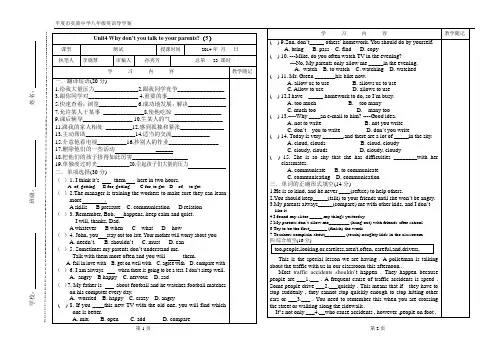
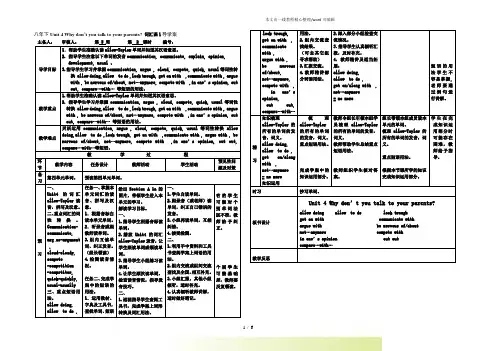
主备人:审核人:第 5 周第 2 课时编号:导学目标1.帮助学生准确认读allow-Taylor单词并知道其汉语意思。
2. 指导学生注意以下单词的发音communication, communicate, explain, opinion,development, usual 。
3.指导学生学习并掌握communication, argue , cloud, compete, quick, usual等词性转换 allow doing,allow to do ,look trough, get on with ,communicate with , argue with , be nervous of/about, not…anymore, compete with ,in one’s opinion, cut out, compare…with…等短语的用法。
教学重点1.帮助学生准确认读allow-Taylor单词并知道其汉语意思。
2. 指导学生学习并掌握communication, argue , cloud, compete, quick, usual等词性转换 allow doing,allow to do ,look trough, get on with ,communicate with , argue with , be nervous of/about, not…anymore, compete with ,in one’s opinion, cut out, compare…with…等短语的用法。
教学难点灵活运用communication, argue , cloud, compete, quick, usual等词性转换 allow doing,allow to do ,look trough, get on with ,communicate with , argue with , be nervous of/about, not…anymore, compete with ,in one’s opinion, cut out, compare…with…等短语。
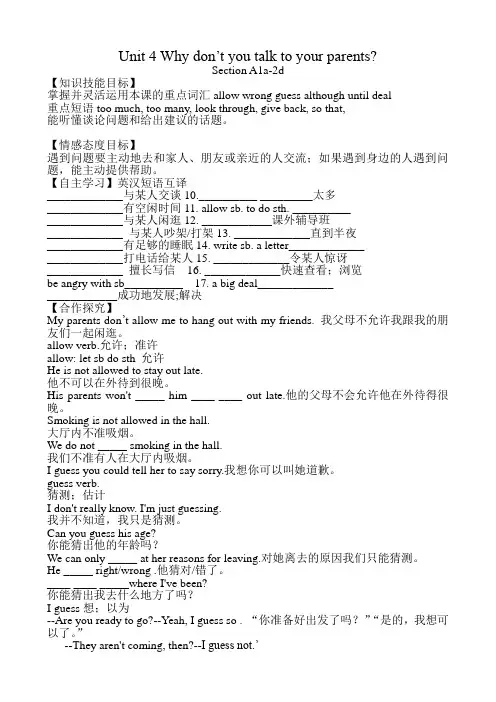
Unit 4 Why don‘t you talk to your parents?Section A1a-2d【知识技能目标】掌握并灵活运用本课的重点词汇allow wrong guess although until deal重点短语too much, too many, look through, give back, so that,能听懂谈论问题和给出建议的话题。
【情感态度目标】遇到问题要主动地去和家人、朋友或亲近的人交流;如果遇到身边的人遇到问题,能主动提供帮助。
【自主学习】英汉短语互译_____________与某人交谈10.__________ _________太多_____________有空闲时间11. allow sb. to do sth. _______________________与某人闲逛12. ____________课外辅导班_____________ 与某人吵架/打架13. _____________直到半夜_____________有足够的睡眠14. write sb. a letter__________________________打电话给某人15. _____________令某人惊讶_____________ 擅长写信16. _____________快速查看;浏览be angry with sb__________ 17. a big deal_________________________成功地发展;解决【合作探究】My parents don‘t allow me to hang out with my friends. 我父母不允许我跟我的朋友们一起闲逛。
allow verb.允许;准许allow: let sb do sth 允许He is not allowed to stay out late.他不可以在外待到很晚。
His parents won't _____ him ____ ____ out late.他的父母不会允许他在外待得很晚。
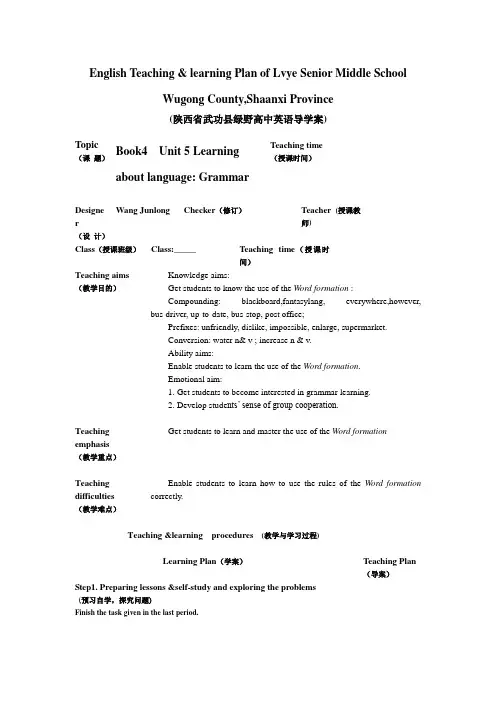
Class (授课班级) Class:_____ Teaching time (授课时间)Teaching aims(教学目的) Knowledge aims: Get students to know the use of the Word formation :Compounding: blackboard,fantasylang, everywhere,however,bus-driver, up-to-date, bus-stop, post office;Prefixes: unfriendly, dislike, impossible, enlarge, supermarket.Conversion: water n& v ; increase n & v.Ability aims:Enable students to learn the use of the Word formation .Emotional aim:1. Get students to become interested in grammar learning.2. Develop stude nts’ sense of group cooperation.Teaching emphasis(教学重点)Get students to learn and master the use of the Word formationTeachingdifficulties(教学难点)Enable students to learn how to use the rules of the Word formation correctly.Teaching &learning procedures (教学与学习过程)Learning Plan (学案)Teaching Plan (导案) Step1. Preparing lessons &self-study and exploring the problems(预习自学,探究问题)Finish the task given in the last period.English Teaching & learning Plan of Lvye Senior Middle SchoolWugong County,Shaanxi Province(陕西省武功县绿野高中英语导学案)Topic(课 题) Book4 Unit 5 Learningabout language: GrammarTeaching time (授课时间)Designer(设 计) Wang Junlong Checker (修订) Teacher (授课教师)Step2.Finishing plan & asking questions(完成学案,提出问题)Report the answers to the class and teacher.Point out the sentences including the Word formation in the text.Task1.turn back to Page 34 to read through the passage Theme Parks---Fun and More Than Fun, pick out the sentences using compound words or words formed by using prefixs or suffixs,, and then underline the words in each sentence and translate the whole sentence into Chinese.Step 1. Ask the Ss to report the answers and read the passage quickly to point out the sentencesinclu ding the Word formationin the text.Step3.Researching cooperatively& answering questions(合作探究,解决问题)And ask the Ss what the rules of the Word formation in the text are. Step2. Encourage the Ss to sum up the rules of the Word formationStep4.Summing &chewing,summarizing knowledge(总结反刍,知识梳理)Task2. Learn something about the word formation:Word formation构词法按照一定的语言规律创造新词的方法叫做构词法。
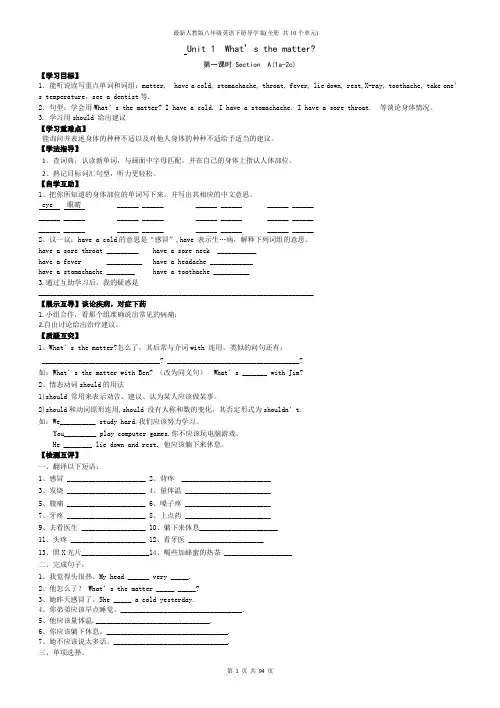
Unit 1 What’s the matter?第一课时 Section A(1a-2c)【学习目标】1.能听说读写重点单词和词组:matter, have a cold, stomachache, throat, fever, lie down, rest,X-ray, toothache, take one’s temperature,see a dentist等.2.句型:学会用What’s the matter? I have a cold. I have a stomachache. I have a sore throat. 等谈论身体情况。
3. 学习用should 给出建议【学习重难点】能询问并表述身体的种种不适以及对他人身体的种种不适给予适当的建议。
【学法指导】1、查词典,认读新单词,与画面中字母匹配,并在自己的身体上指认人体部位。
2、熟记目标词汇句型,听力更轻松。
【自学互助】1、把你所知道的身体部位的单词写下来,并写出其相应的中文意思。
eye 眼睛 ______ ______ ______ ______ ______ ____________ ______ ______ ______ ______ ______ ______ ____________ ______ ______ ______ ______ ______ ______ ______2、议一议:have a cold的意思是“感冒”,have 表示生…病,解释下列词组的意思。
have a sore throat _________ have a sore neck ___________have a fever __________ have a headache ____________have a stomachache ________ have a toothache __________3.通过互助学习后,我的疑惑是_____________________________________________________________________________【展示互导】谈论疾病,对症下药1.小组合作,看那个组准确说出常见的病痛;2.自由讨论给出治疗建议。
【课题】Unit 4 section A 1a-2c (1课时)【学习目标】1.直接引语变间接引语。
2.掌握新词汇be mad at, soap operas, not…any more, call/ring sb, drinks and snacks, have a surprise , party for sb, go to Martcia‘s house, bring … to …3.掌握直接引语和间接引语的用法。
【重点、难点】直接引语变间接引语。
【导学指导】温故知新小组谈论自己喜欢的电视剧,什么是soap operas ?知识梳理一、句型1. What are some soap operas you know? 你所知道的有哪些肥皂剧?you know是定语从句,修饰前面的名词soap operas2. What are some things that happen on soap operas? 肥皂剧里发生了些什么事?That happen on soap operas 是定语从句,修饰前面的名字something.3. Lana said she wasn‘t mad at Marcia anymore.拉娜说她不再生玛西娅的气了。
be mad at (with) sb. 对某人恼火be mad at (about) sth. (doing sth.) 对某事恼火 e.g. Mother got mad at (with) me for watching TV for hours.not… anymore不再…… e.g. She didn‘t cry anymore.她不再哭了。
4. bring some books to her house. 给她带来一些书bring sth. to 从(远处)带来,拿来(到近处)而其反义词为:take… to―从(近处)拿(走)到(远处)e.g. Could you bring some water to me? Please take the chair to Jim‘s room.二、直接引语与间接引语1.含义:直接引述别人的话,叫直接引语,一般前后加引号。
八年级下册Unit5复习学案复习目标:1.掌握第5单元的基础知识、重点语法、核心考点。
2.熟练运用过去进行时和一般过去时谈论过去发生的事情。
3.学会运用过去进行时和一般过去时讲故事。
4.掌握记叙文的文章结构和写作思路。
一.基础知识巩固(一)重点单词1.暴风雨(n.)_______ 2.闹钟(n.)________3.在很大程度上(adv.)________ 4.突然(adv.)________5.报道;公布(v.&n.)______ 6.火柴(n.)________7.窗;窗户(n.)________ 8.倚;碰;撞(prep.)________9.睡着(adj.)________ 10.倒下的(adj.)________11.理解;领会;认识到(v.)________ 12.章节;段落(n.)________13.学生(n.)________ 14.彻底地(adv.)________15.奇怪的(adj.)______ 16.沉默(n.)________17.不久前;最近(adv.)_____ 18.实情,事实(n.)________(二)单词拼写1.(2015济宁中考题改编)Have you ever heard of the saying“S_________ is gold ” ?2.(2015青岛中考题改编)We have nothing a______ running .3.(2016青岛中考题改编)It rained h_______ on my way home yesterday afternoon.(三)词汇拓展1.begin(v.)开始→________(n.)开头;开端2.heavy(adj.)沉的;沉重的→________(adv.)在很大程度上;大量地3.sudden(adj.)突然的;意外的→________(adv.)突然;忽然4.strange(adj.)奇特的;奇怪的→________(n.)陌生人5.wood(n.)木;木头→________(adj.)木头的;木制的6.fall(v.)掉落;下落→________(adj.)倒下的;落下的7.silence(n.)沉默;缄默;无声→________(adj.)沉默的;安静的8.recent(adj.)最近的;近来的→________(adv.)不久前;最近9.true(adj.)真实的;正确的→________(n.)实情;事实10.wind (n. )风→________(adj.)多风的11.ice(n.)冰→________(adj.)覆盖着冰的;冰冷的12. complete(adj.)彻底的,完全的→________(adv.)彻底地,完全地(四)用所给单词的适当形式填空:1.I need ________(silent) when I am studying.2.I haven't seen them ________(recent).3.My brother made a ________(wood) house model by himself.4.Don't always believe advertisement because they may hide some ________(true).5.Everything is hard in the ________(begin), and let us study hard. More practice, much better.(五)核心短语1. (闹钟)发出响声______ 2.接电话________3.进入梦乡;睡着____________4.逐渐变弱;逐渐消失__________5.前往;费力地前进___________________6.沉默;无声__________7.拆除;往下拽;记录___________8.凌乱不堪____________9.说实话_________________ 10.忙于做某事_______________9.对…有(特殊)意义________________________(六) 语法1.过去进行时;2.when,while 引导的时间状语从句课本P36 4a中考链接1.(2014·山东日照中考)—Did you watch the opening ceremony of the World Cup?—No, I ________ an exam.A.have had B.am having C.will have D.was having2.(2013·山东日照中考)—Why didn't you answer my phone call, Jack?—I'm sorry, but I ________ then.A.drove B.drives C.was driving D.have driven二.教材考点精讲考点一pick up的用法【课文原句】I called at seven and you didn't pick up.我七点钟给你打电话,可你没接。
Unit 4 Why don’t you talk to your parents?Section A 主备人:班晓燕 审核人:张婷婷 负责人: 时间:2017/1/18 班级: 组别: 姓名: 评价: 一、【学习目标】 1. 重点单词及短语allow, wrong , midnight , guess ,deal,:What ’s wrong ,look through , big deal , work out ,get into a fight, get on (well) with, instead 或instead of,offer to do sth, mind sb doing sth, and explain sth. to sb. hang over . 2. 重点句型: ①What ’s wrong ? I have to study too much … . I have too many … ②Why don ’t you go to sleep … 二、【学习重难点】1. 学会用why don't you …提建议2. 能够熟练的谈论自己或他人的烦恼及给人提出合理的建议。
三、【知识链接】提建议的相关句型四、【学法指导】1. 运用双色笔在课本上画出单词,短语,句型,标注出自己不懂的问题。
2. 限时自主完成p25-28的内容,独立思考,规范书写。
五、【学习过程】Ⅰ. 自主学习(1) 去睡觉________________ (2) get into a fight_______________(3) 擅长________________ (4) 给某人打电话_______________(5) 闲逛_______________ (6)look through_______________(7) 归还 _______________ (8) get on with sb._______________Ⅱ. 翻译下列句子:(1) 为什么你不和你的家人谈论一下你的这些感觉呢?Why_______________________ with your family?(2) I hope things will be better for you soon._____________________________________________(3)我不能和家人处好。
Unit4How do you make a banana milk shake?设计人第周第课时课型单元基础课2. 根据句意及汉语提示完成下列句子中的题目。
1). I’d like a cup of tea with __________(糖) in it.2). We need to add some __________(黄油) to the bread.3). We need to dig a h_________ to plant a tree.4).Turn on the m________.5).A______ comes after summer.六、达标迁移(约10’)(一)用how many,how much 填空。
_________ orange juice do you want?__________apples are there in the milk shake?__________ fish do you want?__________students are there in your class?(二)翻译:剥香蕉皮________________ 打开搅拌机_________________种树_________________ 洗衣服我们需要多少盐?______________________________________________把玉米放入爆米花机里。
________________________________________我们需要一杯酸奶。
____________________________________________。
(三)选择填空:()1. _________ do we need?A. How many yogurtB. How much cup of yogurtC. How many yogurtsD. How many cups of yogurt()2. It’s cold outside,you’d better _________ your coat.A. put onB. put upC. put downD. put into()3. I’m hungry. Please give me __________.A. a breadB. some breadsC. a piece of breadD. two pieces of breads ()4. —_______ do you make a banana milk shake?A. HowB. WhatC. How toD. Which()5. _______ the window,please. I’m a little cold.A. OpenB. Not openC. Don’t openD. Don’t close()6. —_______ you ________ a pear? —Yes,please.A. Do ;likeB. Would ;likeC. Are ;likeD. Does ;like设计人第周第课时课型听说训练课六、达标迁移(约10’)1. 翻译:打开:__________________切碎:_______________ 把……倒入:__________________ 把……放入:___________ 把……放在……上______________一杯……:___________两勺……______________ 不要忘记做某事_________________2. 补全对话:Anna:Sam,I want to make Russian soup ____ a party on Saturday. Can you tell me how?Sam :Sure. First,but some beef,one cabbage,four carrots,three potatoes,five tomatoes and one onion. Then,cut ______ the vegetables.Anna:What’s next?Sam :Next,put the beef,carrots and potatoes _______ a pot and add some water. After that,cook them _______ 30 minutes. Then,add the cabbage,tomatoes and onion and cook for ____________(另外的)10 minutes.Anna:OK,that’s it?Sam :No,one more thing. Finally,don’t forget _________(add) some salt.Unit4How do you make a banana milk shake?课型阅读训练课六、达标迁移(约10’)1. Complete the passage:In most countries,people usually eat t______________ food on special holidays. A special day in the United Sates is Thanksgiving. It is always on the ______(four) Thursday in November,and is a time_________(give)thanks for food in the autumn.At this time,people also remember the ________(one)travelers from England who came _________(live)in America about 400years ago. These travelers had a long,hard winter,and many of them _______(die). In the next autumn,they gave t_________ for life and food in their new home. These days,most Americans still celebrate this idea of _________(give)thanks by __________(have) a big meal at home with their family.The m__________ dish of this meal is almost always turkey,a large bird.Unit4How do you make a banana milk shake?设计人第周第课时课型读写训练课2. 选择填空()1.Let’s _______ banana and apple milk shake.A. make B. makes C. do D. doing ()2.I need two _______.A. spoon of honeyB. spoons of honeysC. spoons of honeyD. spoon of honeys ()3.—_______ people are there in your town? —One hundred thousand.A. How manyB. How muchC. How oldD. How often()4.First put some salt into the water and then ______.A. mix them togetherB.mix together themC. mix it togetherD. mix together it()5._______ cups of tea do you want?A. How manyB. How muchC. How longD. How old()6.I have three _______ of the _______.A. photos,tomatosB. photos,tomatoesC. photoes,tomatosD. photoes,tomatoes()7.There _______ a lot of milk in this big bag.A. isB. areC. beD. were()8.There are _________ vegetables in the fridge. Go and buy some.A. fewB. a fewC. a littleD. little()9.What _______ Jim do with chocolate yesterday?A. doesB. doC. didD. is3. 根据括号内所给单词的适当形式填空。
初二英语下册导学案(知识汇总+练习题)Unit 1单词matter [ˈmætə] v. 重要,要紧,有关系What’s the matter? 怎么了?出什么事了?sore [sɔ:(r)] adj. 疼痛的,酸痛的have a cold 感冒stomach ['stʌmək] n. 胃,腹部stomachache ['stʌməkeɪk] n. 胃痛,腹痛have a stomachache 胃痛foot(复数feet) [fu:t] n. 脚neck [nek] n. 颈,脖子throat [θrəʊt] n. 喉咙fever ['fi:və] n. 发烧,发热lie [laɪ] v. 躺,平躺lie down 躺下rest [rest] n. 剩余部分,其余;放松,休息cough [kɒf] n. & v. 咳嗽X-ray ['eksreɪ] n. X光,X射线toothache [ˈtu:θeɪk] n. 牙痛take one's temperature 量体温headache [ˈhedeɪk] n. 头痛have a fever 发烧break [breɪk] n. & v. 休息,暂停;打破take breaks (take a break)休息hurt [hə:t] v. 伤害,损害,使受伤,疼passenger ['pæsɪndʒə] n. 乘客,旅客off [ɒf] adv. prep. 离开(某处);从…去掉get off 下车to one's surprise 使…惊讶,出乎…意料onto [ˈɒntə] prep. 向,朝trouble [ˈtrʌbl] n. 麻烦,烦扰,问题hit [hit] n. & v. 碰撞,打,打击right away 立即,马上get into 陷入,参与herself [hə:ˈself]她自己,她本身(she的反身代词)bandage ['bændɪdʒ] n. & v. 绷带;用绷带包扎sick [sɪk] adj. 患病的,不适的knee [ni:] n. 膝盖nosebleed [ˈnəʊzbli:d] n. 鼻出血breathe [bri:ð] v. 呼吸sunburned [ˈsʌnbɜ:nd] adj. 晒伤的ourselves [ɑ:ˈselvz]我们自己(we的反身代词)climber [ˈklaɪmə(r)] n. 登山者be used to 习惯于… 适应于…risk [rɪsk] n. & v. 风险,危险;冒险take risks (take a risk) 冒险accident [ˈæksidənt] n. 意外事件;事故situation [ˌsitjuˈeiʃən] n. 状况,形式,情况kg=kilogram [ˈkɪləgræm] n. 公斤,千克rock [rɔk] n. 岩石run out (of) 用尽,耗尽knife [naif] n. 刀,餐刀cut off 切除blood [blʌd] n. 血mean [mi:n] v. 意味着,意思是,意欲get out of 离开,从… 出来importance [ɪmˈpɔ:tns] n. 重要性decision [dɪ'sɪʒn] n. 决心,决定,抉择control [kən'trəʊl] v. 控制,支配,操纵be in control of 掌管,管理spirit ['spɪrɪt] n. 勇气,意志death [deθ] n. 死亡give up 放弃nurse [nə:s] n. 护士Unit1 知识梳理【重点单词】matter [ˈmætə] v. 重要,要紧,有关系What’s the matter? 怎么了?出什么事了?sore [sɔ:(r)] adj. 疼痛的,酸痛的have a cold 感冒stomach ['stʌmək] n. 胃,腹部stomachache ['stʌməkeɪk] n. 胃痛,腹痛have a stomachache 胃痛foot(复数feet) [fu:t] n. 脚neck [nek] n. 颈,脖子throat [θrəʊt] n. 喉咙fever ['fi:və] n. 发烧,发热lie [laɪ] v. 躺,平躺lie down 躺下rest [rest] n. 剩余部分,其余;放松,休息cough [kɒf] n. & v. 咳嗽X-ray ['eksreɪ] n. X光,X射线toothache [ˈtu:θeɪk] n. 牙痛take one's temperature 量体温headache [ˈhedeɪk] n. 头痛have a fever 发烧break [breɪk] n. & v. 休息,暂停;打破take breaks (take a break)休息hurt [hə:t] v. 伤害,损害,使受伤passenger ['pæsɪndʒə] n. 乘客,旅客off [ɒf] adv. prep. 离开(某处);从…去掉get off 下车to one's surprise 使…惊讶,出乎…意料onto [ˈɒntə] prep. 向,朝trouble [ˈtrʌbl] n. 麻烦,烦扰,问题hit [hit] n. & v. 碰撞,打,打击right away 立即,马上get into 陷入,参与herself [hə:ˈself] pron. 她自己,她本身(she 的反身代词)bandage ['bændɪdʒ] n. & v. 绷带;用绷带包扎sick [sɪk] adj. 患病的,不适的knee [ni:] n. 膝盖nosebleed [ˈnəʊzbli:d] n. 鼻出血breathe [bri:ð] v. 呼吸sunburned [ˈsʌnbɜ:nd] adj. 晒伤的ourselves [ɑ:ˈselvz] pron. 我们自己(we的反身代词)climber [ˈklaɪmə(r)] n. 登山者be used to 习惯于… 适应于…risk [rɪsk] n. & v. 风险,危险;冒险take risks (take a risk) 冒险accident [ˈæksidənt] n. 意外事件;事故situation [ˌsitjuˈeiʃən] n. 状况,形式,情况kg=kilogram [ˈkɪləgræm] n. 公斤,千克rock [rɔk] n. 岩石run out (of) 用尽,耗尽knife [naif] n. 刀,餐刀cut off 切除blood [blʌd] n. 血mean [mi:n] v. 意味着,意思是,意欲get out of 离开,从… 出来importance [ɪmˈpɔ:tns] n. 重要性decision [dɪ'sɪʒn] n. 决心,决定,抉择control [kən'trəʊl] v. 控制,支配,操纵be in control of 掌管,管理spirit ['spɪrɪt] n. 勇气,意志death [deθ] n. 死亡give up 放弃nurse [nə:s] n. 护士【重点短语】1.have a fever 发烧2.have a cough 咳嗽3.have a toothache 牙疼4.talk too much 说得太多5.drink enough water 喝足够的水6.have a cold 受凉;感冒7.have a stomachache 胃疼8.have a sore back 背疼9.have a sore throat 喉咙痛10. take risks 冒险11.hot tea with honey 加蜂蜜的热茶12.see a dentist 看牙医13.get an X-ray 拍X 光片14.take one’ s temperature 量体温15.put some medicine on sth. 在……上面敷药16. give up 放弃17. sound like 听起来像18. all weekend 整个周末19. in the same way 以同样的方式20. go to a doctor 看医生21. go along 沿着……走22. on the side of the road 在马路边23. shout for help 大声呼救24. without thinking twice 没有多想25. get off 下车26. have a heart problem 有心脏病27. to one’ s surprise 另某人惊讶的是28. thanks to 多亏了;由于29. in time 及时30. make a decision 做出决定31. get into trouble 造成麻烦32. right away 立刻;马上33. because of 由于34. get out of 离开;从……出来35. keep on doing sth. 继续或坚持做某事36. put a bandage on sth. 用绷带包扎37. fall down 摔倒38. feel sick 感到恶心39. have a nosebleed 流鼻血40. cut his knee 割伤他的膝盖41. put her head back 把她的头向后仰42. have problems breathing 呼吸困难43. mountain climbing 登山运动44. be used to doing sth. 习惯做某事45. run out (of) 用完;用尽46. so that 以便47. so...that... 如此……以至于...…48. be in control of 掌管;管理49. in a difficult situation 在闲境中【重点句型】1. What's the matter with you?= What'the trouble with you?= What's wrong with you? 你怎么了?2. What should she do? 她该怎么办呢?3.Should I take my temperature? 我应该量一下体温吗?4.You should lie down and rest. 你应该躺下休息一会儿。